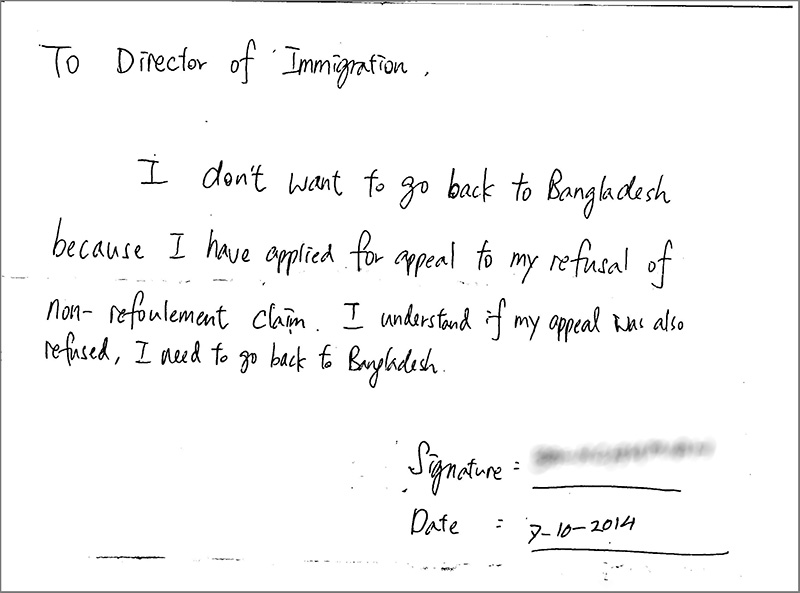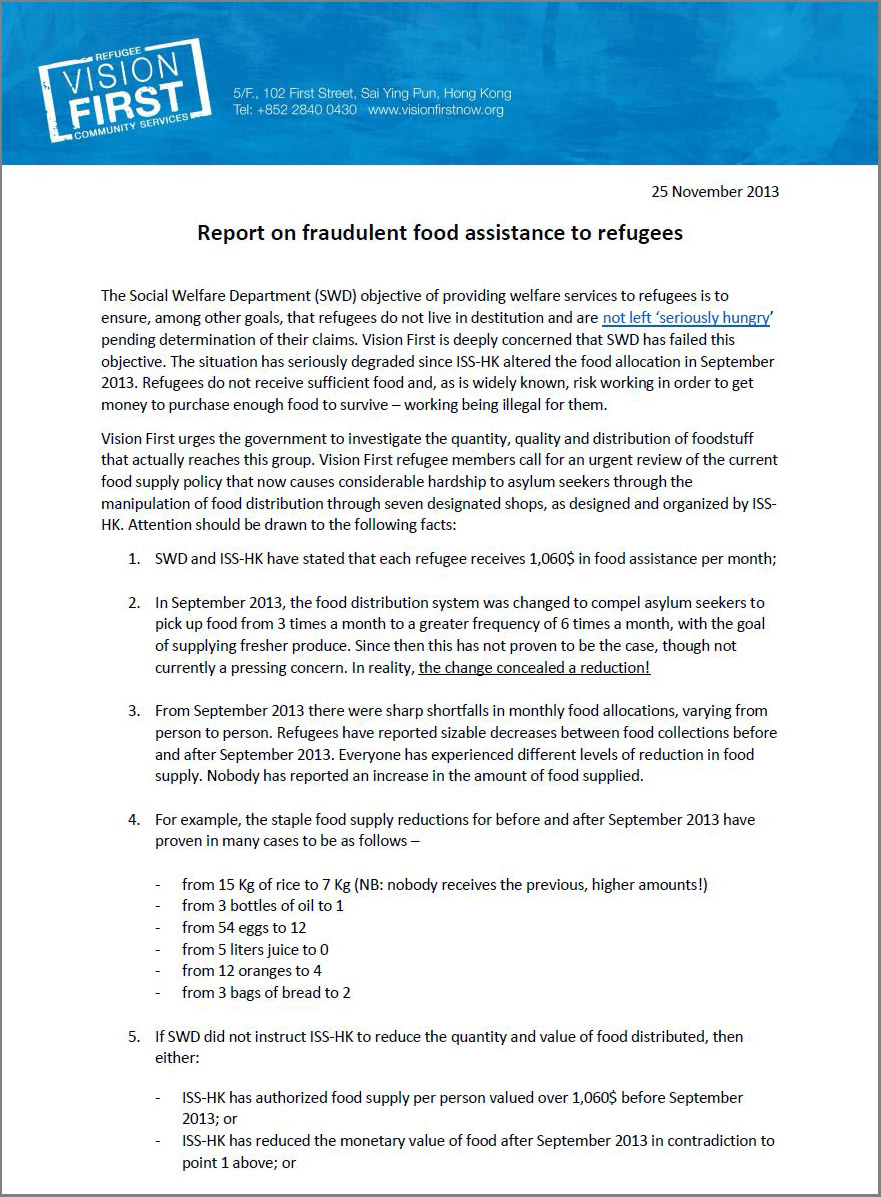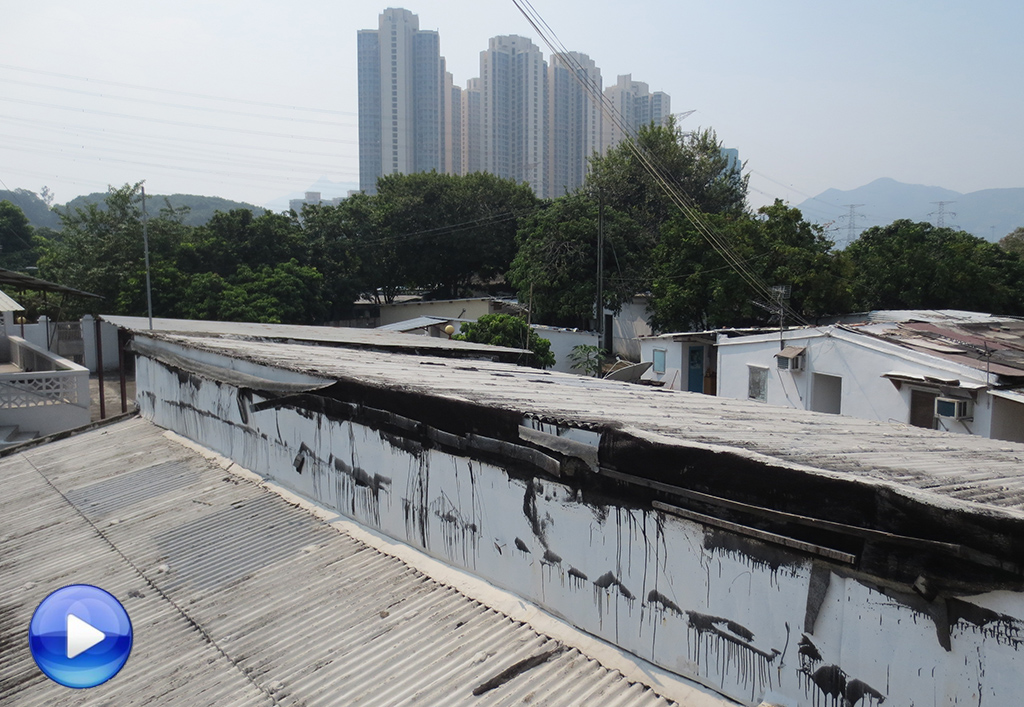VF Reports – Refugee family faces homelessness again
Oct 27th, 2014 | Advocacy, Housing, VF Report | Comment
Vision First reports that 15 months after losing their home, a refugee family from Togo risks being homeless again with two young children. On 16 July 2013 we reported this family’s predicament when a rental increase for a rundown flat in Cheung Sha Wan put the family on the streets. ISS-HK had refused to pay a 900$ rent increase and an inexpensive 4500$ flat was lost.
Ibrahim explained that he had gone to the ISS-HK office and suggested to sleep there, if he was not booked into a guesthouse, or provided with an alternative arrangement. Instead, Ibrahim says he was removed by the police that were called to deal with a welfare issue. A less than humanitarian confrontation ensued and was reported by AM730 daily, exposing the grim reality of refugees crushed between insufficient welfare and draconian jail sentences for working.
A few days later the family was accommodated in a guesthouse where they resided for over a month. This arrangement may have cost tax-payers at least 12,000$ that we think could have been saved if 900$ had been confirmed for the original home. That wasn’t the end of it: from September 2013 till October 2014, the family was housed in a To Kwa Wan flat estimated to cost 2000$ more than the 4500$ flat they had been evicted from.
How much public money was wasted between July 2013 and October 2014?
Fast forward one year and the family faces the same predicament. On 22 October 2014 Ibrahim was notified by ISS-HK (without a letterhead) that his family would be evicted on 30 October 2014. Further, Ibrahim reported that electrical power to the flat was cut the previous week allegedly to force his eviction. He complained to the SWD Head-office and an urgent intervention by SWD staff compelled ISS-HK to supply battery-powered lamps to prevent the family from living in the dark. Now Ibrahim is worried that the water supply will be cut, as that would be unbearable for his wife and children.
Ibrahim says that he was urged to find a flat for 6000$ a month, but the family was frustrated by sky-rocketing rents and a lack of bus money to go flat-hunting around Kowloon. Ibrahim had previously reminded his ISS-HK case worker, “I don’t mind if the new place cost 1000$ or 6000$. If it is suitable for my family I will take it. But don’t tell me to pay extra money, because I don’t have money and I am not allowed to work.”
Ibrahim was hopeful when last week ISS-HK asked him to inspect another flat in To Kwa Wan that he saw and found suitable. The place was good, but there was a problem. Ibrahim was told by ISS-HK that he should find 4000$ to close the deal, as the rent is 7000$ and his rent allowance 6000$. In practice, Ibrahim requires 2000$ to top up two months deposit, 1000$ for the first month rent and 1000$ for the utility deposits. Ibrahim was stunned by what he was told, knowing that he cannot obtain any money unless he gets a job.
Vision First respectfully asks SWD to confirm that Ibrahim and his wife are authorized to work for the time they require to raise $4000 and thereafter to raise $1000 to pay the rent surplus that ISS-HK seem unwilling to provide to pay the family’s monthly rent in full.
Ibrahim commented to Vision First, “ISS gave me a budget of 6000$, but then sent me to see a 7000$ flat and expects me to find 4000$ cash! What are they thinking? My case worker told me to call NGOs and find the money. I am not a beggar and she is paid to house me. She knows I have no money and cannot work. It is shameful that ISS give refugees low budgets and then expect them to sign contracts and struggle every month to find extra money for rent!”
For nine years Ibrahim endured the inhospitable conditions of seeking asylum in Hong Kong. He has learned to speak up for himself and hold his ground as a protection claimant who, it should be noted, hasn’t been screened by Immigration Department since he arrived in October 2005.
Ibrahim assures, “This time I will go to the media myself and bring this matter to the public’s attention. I will not become homeless again without a struggle. I will refuse to move into a guesthouse where my children suffered too much last year. There was no space to move in the small room and we ate instant noodles and biscuits for a month, because we were not allowed to cook.”
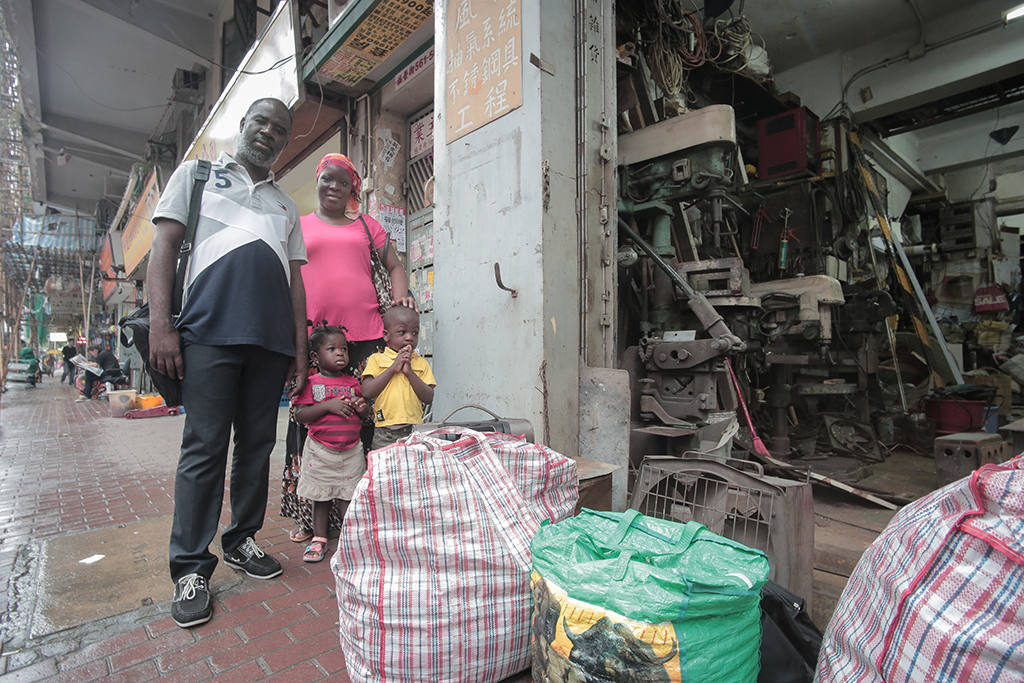
VF Reports – Is this rendition?
Oct 10th, 2014 | Advocacy, Immigration, VF Report | Comment
Vision First reports the case of a Bangladeshi refugee who sought asylum in 2008 and is still genuinely fearful of the danger he would face should he be returned to his country. His non-refoulement claim was rejected at first instance in September 2014 after more than six years of deliberation. The claimant is aware that Hong Kong has a perfect zero percent acceptance rate of Bangladeshi refugees since 1992. (Compare yearly acceptance rate of >40% in Australia)
On 7 October 2014, on routine reporting to the Immigration office in Mataukok, the claimant was summoned to an interview room where he was warned of imminent removal despite having filed an appeal with the Torture Claim Appeal Board within the allocated time. The claimant stated emphatically that he spoke little English and had trouble understanding what was being said to him. Of significance, neither a Bengali interpreter, nor a duty lawyer were present.
It is unclear what was discussed during the interview. The claimant reports that significant pressure was exerted on him to sign a document the significance of which he did not comprehend. While he had not requested to voluntarily depart Hong Kong, the Immigration officer handwrote a notice that he was made to sign. The document stated, “I understand if my appeal was also refused, I need to go back to Bangladesh”. Only after signing the document was the claimant allowed to leave the room.
The claimant warned the officer that his life would be in serious danger if he was returned to Bangladesh where political enemies were still searching for him eight years after he fled to Hong Kong. He first politely requested a photocopy of the notice and explained “because I don’t know what is says”. But a shouting match followed in which the officer refused to provide a copy and the claimant refused to leave. Eventually the officer left the interview room and returned five minutes later with a photocopy of the document.
On 9 October 2014, the claimant registered at Vision First seeking assistance against what, in our view, amounts to de facto rendition – the practice of handing over individuals from one jurisdiction to another with questionable consideration of the legal process. Facts lead us to believe that the notice was prepared as an acknowledgement and, by implication, a consent by the claimant to be removed to Bangladesh after his appeal will be rejected.
While circumstances surrounding this event are unclear, the claimant reports being intimidated by the conduct of the Immigration officer and being fearful of detention pending the outcome of his appeal, whereby he would have been denied an opportunity to apply for a judicial review at the High Court.
Vision First never before sighted such a handwritten notice which is inconsistent with domestic and international legal principles. It purports to represent an unconstrained declaration by a refugee who seems unwilling to pursue further legal remedies after the likely rejection of his appeal case, but actually its production is both sinister and disturbing. The notice is manifestly neither a legal document, nor a standard Immigration form. Vision First emailed its concerns to the Immigration Department and will monitor the liberty of this claimant.
Refugees are strongly urged not to sign documents from government departments, Immigration in particular, which they do not fully understand and for which legal advice and professional interpretation was not provided. If in any doubt, the correct procedure is to take the documents away to seek independent legal advice before signing them.
VF Reports – the deposit refund problem
Sep 29th, 2014 | Advocacy, Housing, VF Report | Comment
Vision First launches a series of blogs, under the title “VF Reports”, to make public challenges refugees report to us that we believe are of great public concern. One by one these might be considered minor cases, often personal in nature, although the troubles suffered by one person are often indicative of a wider malaise that should be thrust into the spotlight, because the predicaments of refugees endanger public safety.
On the one hand, this hardship is arguably not restricted to the refugee community, but speaks of a broader ‘humanitarian deficit’ in Hong Kong. On the other, it is the result of public attitudes and policies towards the underprivileged that may ultimately result in higher crime rates and illegality that cause undesirable, and preventable, domino effect in society.
In this respect, the “VF Reports” will draw from stories narrated by refugees and correspondence with relevant government department and agencies whose assistance Vision First seeks to remedy situations that, in our view, fail to deliver legitimate services, violate refugee rights and ultimately pose a threat to public safety as well as law and order.
Vision First reports the case of two South Asian refugees, one suffering from an incurable and transmittable disease, who informed that they recently signed a contract for a small flat in Sham Shui Po. Fearing to become homeless when previous contracts expired, these two friends took the initiative to locate a modest flat offered for 3300$ a month. They knew that the singleton rent allowance should be up to 1500$, so they agreed to share a room.
Their commendable efforts however turned into a nightmare. Familiar with local realty customs and aware that bargain flats do not remain long on the market, Vision First was told by these two middle-aged men that they persuaded a resident friend to lend them 9,250$ to close the deal. This included 3,300$ for the security deposit, 3,300$ for the first month rent, 1,650$ in agency fees and 1,000$ for the water and electricity deposits.
Satisfied with their new home, the two refugees took the paperwork to their case workers at the NGO contracted by the government to provide refugees with services. To their great disappointment, their case workers apparently said they cannot refund the security deposit, first month rent and agency fee. It is unclear why this occurred, but the two refugees reported that the refusal caused them great distress, as they had promised the kind lender to refund 9,250$ they had urgently required to secure the bargain flat they would call home.
The refugees reported that they anxiously explained to their case workers that if they hadn’t borrowed money to secure that room, the landlord would not have waited for them or for their case workers to visit and confirm the unit in the future. Time, for them, was indeed of the essence.
The two men also reported that in an attempt to find an alternative solution, their case workers apparently suggested that they give up that flat so that the case workers could pay cash for another unit. This however would imply the forfeit the money already borrowed and paid to the first unit. They pointed out that refugees are prohibited from working and had relied on a refund to repay a loan made to them in good faith, as such expenses should be paid according to these SWD instructions.
It appears that unnecessary hardship was inflicted upon these two refugees. In saying this, we do not imply that anyone concerned was at fault. It may well be that the refugees did not understand often rigidly drafted policies. However, it is obvious that these refugees are now hard pressed to seek remedies to their predicament that might raise their visibility with authorities.
These two friends might have to work to earn 9,250$ to repay the loan that secured their home. If public policy is aimed at upholding law and order, shouldn’t these two refugees be exceptionally permitted to raise emergency funds to solving this financial crisis? But work is prohibited for refugees, so do they need to turn into criminals to secure adequate housing? Wouldn’t a sentencing magistrate be keenly interested in the denial of service that caused this predicament in the first place?
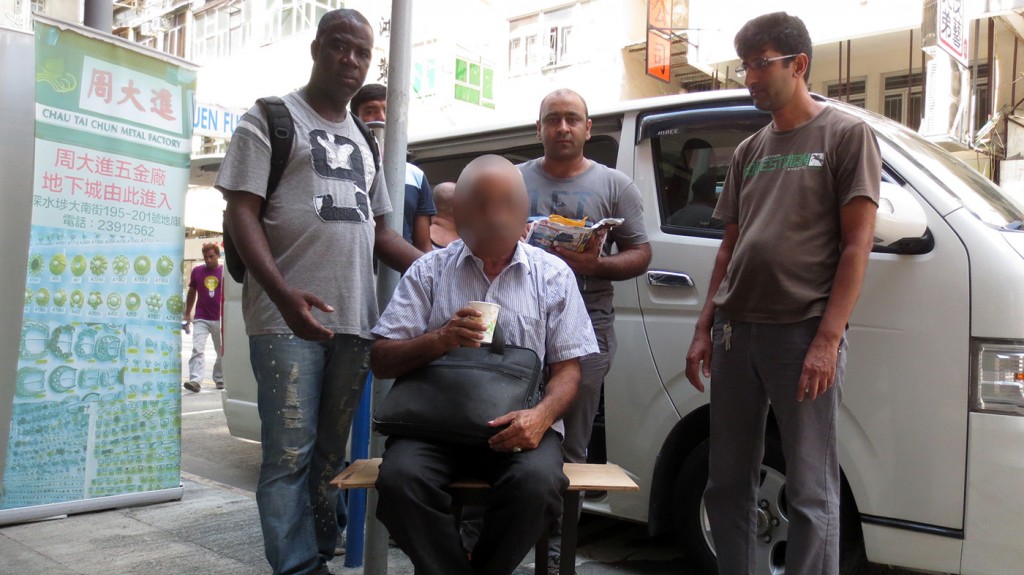
Illegal activity at the ISS-HK appointed Safwan Provision Store
May 30th, 2014 | Advocacy, Food, VF Report, Welfare | Comment
Reliably sources close to the ISS-HK food team, informed Vision First that in late 2013 Hong Kong Customs mounted a special operation to combat the cross-boundary smuggling of illicit cigarettes and distribution of cigarettes in the Yuen Long area.
Customs agents raided Safwan Provision Store, one of the ISS-HK appointed shops in Yuen Long, where it is reported that they seized 500,000 cigarettes smuggled into the city without payment of stamp duty.
Vision First was also told that a shop partners was convicted for the offense and jailed for 2.5 months, as well as fined 1.8 million dollars. It is rumored that only one of the two partners took the fall for the illegal merchandise stacked in the storage, while the other continued to run the business.
The refugee community reports that illicit cigarettes are currently available at the same location, and from there allegedly distributed to numerous ethnic grocery shops across the territory.
Vision First was further informed that ISS-HK, claiming that contraband cigarettes are not related to the food business, did not terminate Safwan’s contract for the distribution of food rations to approximately one thousands refugees. We hope this decision was well pondered and wisely made.
However, Vision First has been informed by the refugee community, that the same shop is distributing milk that many refugees believe to be smuggled. It is indeed plausible that a trading company that smuggles one product might also be smuggling others.
Thoughtful consideration should also be given to the 1.8 million dollar fine, a loss that owners would seek to recover most rapidly, perhaps even cutting corners in food related services.
Refugees informed Vision First that Safwan is distributing smuggled milk to ISS-HK clients.
SAFA Milk is produced by Gulf & Safa Dairies Company in Dubai, UAE. Informed sources told Vision First that this brand of milk is currently being provided to refugees, a brand of milk that we have researched is not licensed for consumption in the territory.
Information on the package obtained by Vision First is problematic: the 3.0g fat content is lower than the minimum 3.5g required by law; the address of the Hong Kong distributor is missing; the nutritional information does not comply with the Hong Kong “chat ga yat” or “seven plus one”.
Our research confirms that reconstitute SAFA milk from dairy cows in the desert country of the United Arab Emirates is not licensed for importation, distribution or consumption in Hong Kong. This situation raises a red flag not only about Safwan’s business methods, but also about the SWD and ISS-HK welfare practices.
Further and in addition, the refugee community is concerned that ISS-HK selected SAFA milk for the food rations distributed by all three ISS-HK branches to refugees requiring emergency provisions. Could this relate to the fact that it might be the cheapest milk as it bypasses regular import channels?
It is assumed that management of the ISS-HK food team is fully aware of irregular labels on SAFA milk packaging that would manifestly strike any professionally trained eye at first glance.
In this regard, we can only hope that no offence has been committed by ISS-HK and the refugee community is not again object of unscrupulous exploitation. However, the evidence seems to indicate otherwise.
Vision First urges relevant government departments, including Hong Kong Customs, to urgently investigate these allegations and ensure that the health and safety of refugees is not compromised by prohibited practices.

Complaints mount against Safwan Provision Stores
May 30th, 2014 | Advocacy, Food, VF Report, Welfare | Comment
Vision First received numerous complaints against Safwan Provision Store, appointed by ISS-HK to provide food rations, paid by the government purse, to approximately 1000 refugees who live in the Yuen Long area.
It is unclear why more complaints are raised against Safwan than the other six ISS-HK stores. Perhaps this relates to the Pakistani proprietors refusing to address complaints and instead exasperating refugees with taunts like, “Go and complain to the Refugee Union, see if I care!”
Provided with two rotten apples for a ten day period, a refugee lady protested, “You see, it is black. How do I eat this?” The shopkeeper taunted her, “OK, this apple, you give it to the Refugee Union and complain! What will the Refugee Union do to me?”
The rations supplied are of such substandard quality that reportedly half of the refugees take cash instead. The transaction is arranged by first signing collection notices at the designated shop at Chun Chu House, and later getting cash at another Safwan store in the Hope Yick Commercial Center, also in Yuen Long.
This arrangement defrauds Hong Kong Government by discounting 10-day food rations, originally valued at 400$, to approximately 160$ depending on items selected. This results in 1200$ monthly food rations being worth 480$ in the hands of refugees, with a 720$ mysterious loss to tax-payers.
Only a voucher system guarantees the eradication of fraud in the food distribution system.
Sources familiar with ISS-HK food distribution informed Vision First that Safwan doesn’t provide refugees with traditional basmati rice (13$/Kg), but instead mixes Pakistani ‘PK365’ rice (9$/Kg) with a cheap Vietnamese variety (3$/Kg). This is done when repackaging rice into 5Kg bags for ISS-HK clients.
A refugee mother complained, “This is old rice. It smells like cooking gas [methane]. After cooking it smells very bad and taste bad. The colour is very white, as it is bleached again. The package says Basmati Rice, but it is regular rice. We know the difference because we eat rice since we are babies.”
The quality of the bread is equally dreadful and packages are often distributed 2 days before expiry dates for a 10 to 12 day period. Perhaps refugees are expected to gorge themselves and then starve until the next collection. On 15 May 2014, Safwan gave a refuge mother a bag of bread that had been chewed through by a rat.
The majority of refugees cannot read English and are unable to verify what items are delivered by the shop. This explains complaints whereby refugees might collect “Fish” instead of “Halal Chicken”, because collection notices are typed in English and claimants are too shy to ask for help.
The best many refugees can do is count the items on the collection notices and ensure they correspond numerically to the items collected. Any discrepancy in foodstuff is ascribed to case workers having mixed up the order and unscrupulous shopkeepers can swap items with impunity.
With regard to the unlicensed Safa Milk, refugees noticed that other legitimate brands are kept on the shelves in view of CCTV cameras, while cartons of Safa milk are placed into the grocery bags at the time of collection. The construction of the shelving unit is such that video cameras, viewed by ISS-HK through web connections, are unable to record the entire transaction.
It is hard to understand why ISS-HK is unwilling or unable to monitor dodgy practice at Safwan.

ISS-HK discriminates against FDH
May 13th, 2014 | Food, Housing, Personal Experiences, VF Report, Welfare | Comment
Case workers at ISS-HK fancy themselves Immigration officers in training. Instead of treating every client as a destitute asylum seeker without money or work rights, case workers tailor services according to nationality. By doing so they fail in their role as contractor for social welfare services.
The SWD instructions to ISS-HK concern “enhancing the humanitarian assistance for non-refoulement claimants” without consideration of nationality and previous immigration status. All protection claimants must be treated equally irrespective of how they arrived, or whether they work visa prior to seeking sanctuary.
Vision First is concerned about the prejudiced treatment of ex-Foreign Domestic Helper by ISS-HK case workers. To support this claim we offer a comparison between two African and two Indonesian ladies living together:
Example A: Two Somali ladies requested ISS-HK pay in full a shared 4000$ room in Kowloon. They state their claim pointing out that nothing cheaper was available, and they were banned from working. They met initial refusal with a promise of a sit-in until their non-negotiable request was met. And they got what they wanted!
Example B: Two Indonesian ladies requested ISS-HK pay in full a shared 3000$ room in a slum. They noted that the room was cheap and each could receive 1500$ rent assistance. Their case worker Tanya Tse refused to provide what they were entitled to. Tanya said, “It’s enough to give you 1400$ each. That is enough. Just sign and go!”
Tanya Tse also arbitrarily reduced the utility allowance from 300$ to 200$ each, despite the SWD clearly stating that, “300$ per month which may be used to meet different utilities charges (i.e. water, gas, electricity, etc.)”
Tanya Tse visited the room in illegal structures and signed an Agreement on Provision of Assistance bearing false information. Both Indonesian ladies were provide with ISS-HK agreements stating, “I confirm my address to be at Letter Box, XXX Shek Tong Tsuen, Au Tau”. Clearly two people cannot live inside a letter box!
Tanya Tse does not abide by the principle: “Treat other people the way you want to be treated.”
Vision First is deeply concerned about food problems at the ISS-HK appointed shops, New Bauddha and Safwan in Yuen Long. The quality problem is a shortcoming of the shops, though we understands that ISS-HK case workers are responsible for the quantity/selection problem. These issues must be addressed by the SWD:
- The rice is contaminated with excrement. A lady said, “The rice is very bad. Sometimes the rice is so smelly. Inside have shit. The rice is no good. When you finish cooking it becomes very smelly. Even if you wash very clean it is no good. All people are saying no good this rice … Everyone complain and asking how to solve this problem … Please ask them to change the rice. We cannot eat it!”
- Food selections are cut short. Milk, milk powder and Milo are not distributed despite being ticked on the order sheets. A lady complained, “If Tanya wants to give, she will give. If she doesn’t want to give, she will not give. It depends what she wants to give. Also, things like eggs and spices she never gives. I think that in one month I get 600$ [worth of foodstuff]. Sometimes she only gives onion too much and expensive food don’t give. Vegetables too much give because it is cheap. Milk, powder milk, Milo don’t give.”
- Cooking oil is insufficient despite what is selected on the forms. A lady explained, “I ask for cooking oil but only receive three small bottles a month. The very small bottles. We write the big one but they give the small one only. They give small one because it costs less money. How can we cook without oil?
- Basic toiletries, including detergent for clothes, must be distributed monthly as SWD pays ISS-HK for such provisions. Many refugee ladies share this complaint, “Sometimes they don’t give us toiletries. The shop doesn’t give every month. They give only one time in two months. The soap is not enough for us. They should give more as we need it to wash our clothes. We only get ONE toilet tissue roll each month. That is not enough for one month. If we cannot work how we buy toilet paper?”
- The food collection should be every 10 days. However, to save money over time, the ISS-HK shops progressively extend the frequency to as many as 15 days. The excuse of public holidays doesn’t hold up when distributing emergency rations to hungry people with no options. Distribution dates should be brought FORWARD, not pushed backward. A lady protested, “It is very bad, so we don’t have enough food and we are hungry. My food is not enough for 5 days. How can it last me for 15 days? They say we collect food every 10 days, but they lie. Now it is always 12 days or longer. And I don’t have any money …”
- These refugee ladies are intimidated by the male staff at the ISS-HK shops. If the ladies complain, the vendors shout back, “This is not your business. You ask your case officers. You are lucky we give you this!”It appears that these vendors believe they are engaged in charitable distribution. They forget that their bosses are paid tens of millions of dollars from the government purse to provide essential assistance to needy people. Would they speak like this to their Chinese customers?
- These refugee ladies get no redress from ISS-HK case workers. One explained, “We complain many times to Tanya and she just says, ‘Next time, next time.’ But [there is] never any change. Tanya doesn’t want us to complain. She said to me, ‘Don’t listen to what other people say. No need to complain too much!’
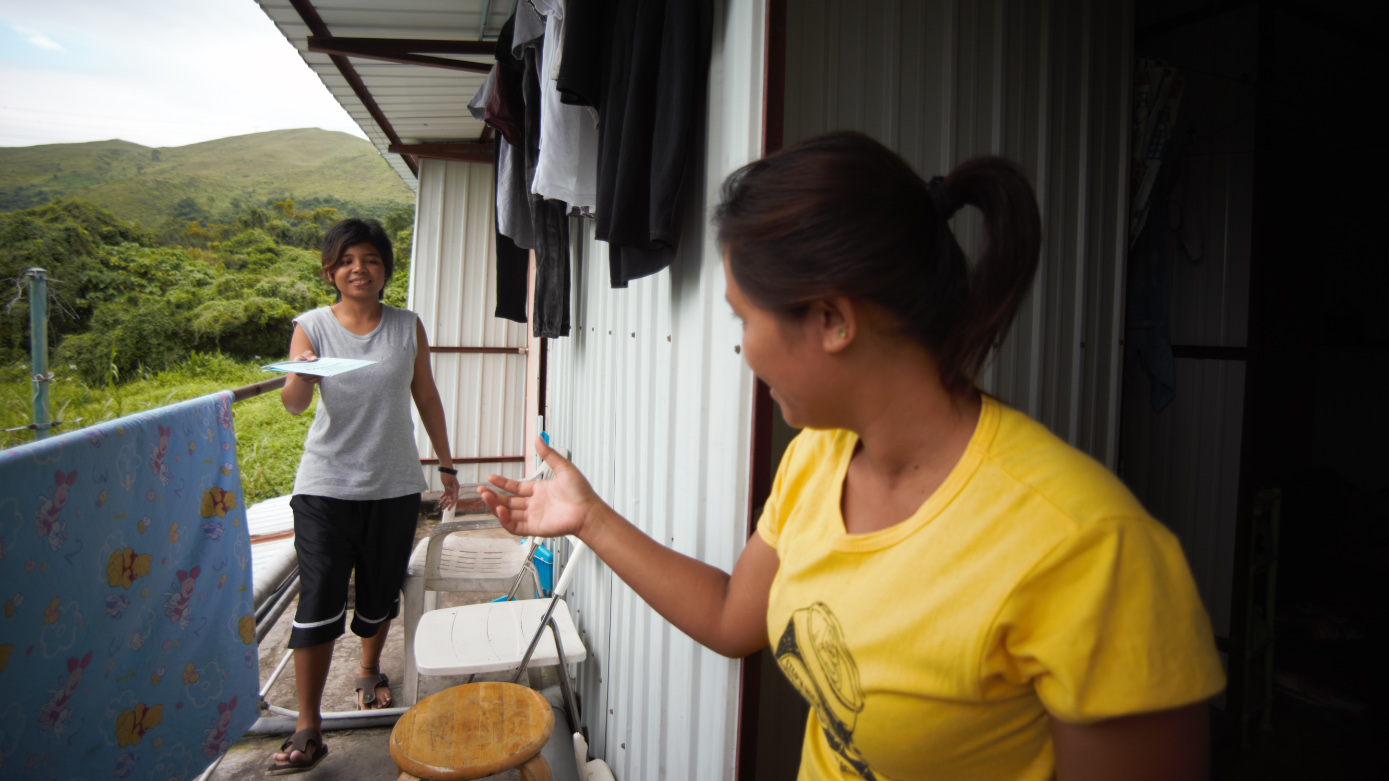
ISS-HK fails to meet basic needs of shelter and food
Apr 19th, 2014 | Advocacy, Food, Housing, VF Report, Welfare | Comment
Complaint One
Refugee Bobby lives in a converted pig farm and collects food rations at the Nepali shop in Yuen Long. He has to buy groceries when the 10-day ration runs out in 6 to 7 days. Every day is a struggle to make ends meet. A far cry from the comfortable life he had in Africa.
Bobby explains, “My family was prominent and we lived well. Because my father opposed the government everything fell apart and we were persecuted. I left to save my life. You think I come here to beg for this rubbish food ISS gives me?”
He continues, “A few months ago I went to collect food with a friend. At the shop I saw that he was getting more food than me. I said, ‘Wait a minute. This is not right’. We are both refugees. We are the same age and the same hungry. Why he get more?”
Later Bobby complained to his ISS-HK case worker Mary Lee. Mary opened his file and said, “Let me check if you used all your money.” She made some calculations and exclaimed, “You can add a few chickens and take more food.”
The hungry and destitute refugee was speechless realizing that, a) Mary had cut short his food allowance, b) Mary was fully aware how much value he was getting, c) Mary had not provide the full 1200$ food allocation when needed, d) Mary provided more food after he complained.
Bobby was furious and shouted, “Give me all my money (food value) and stop this! Bring me to the top (of my food allowance) and it is finished. This is the way we do it!”
He reported to Vision First, “Some refugees don’t complain, but if you do then ISS gives them the full amount? The problem is if you come new (new-arrival), and you don’t know, they don’t give you all the money. It is later when you complain that they give you more to shut your mouth. This is wrong!”
Complaint Two
Refugee Raja lives in an ungodly slum without clean running water, kitchen plumbing and toilet sewerage. It is no mystery that many tenants suffer from chronic gastroenteritis. He has been losing weight since he arrived in 2009 and is skin and bones now.
Raja reports, “Really this food is not enough. They say it is 1200$ a month but they are lying. Two chickens and two (pieces of) mutton for ten days is not enough. Then I must go buy (more food). Three tomatoes and two onions they want us to eat (for) ten days? I ask my friend, please give me some vegetables, (because I have) not enough.”
The distraught refugee points at a countryman writhing in pain, “Look at my friend. Look at his photo when he arrive in 2008. He was strong man. Very handsome. Before he is 68Kg and now he is 40Kg. He has so much pain (in the stomach), but hospital never give him good medicine. He suffer much. Look at him now … dying man!”
Raja cannot hide his anger, “Maybe next year he die. Then ISS is responsible. The food always make us sick. The food is expired. The vegetable is, how to say? … Bad, very bad … cannot eat it! We are sick from ISS food. We have pain (in the stomach, then) we are hungry but cannot eat. So much pain!”
He continues, “I am from India but only in Hong Kong I (have been) hungry! So much pain. I complain to (case worker) Felicity Wong, but she don’t listen. I say to her my food is not enough, my food is 250$ not 400$, but she don’t care. Who make inspection of this problem? Me not (allowed to) working. I have no money for buying food. This veeery big problem. Where the money coming???”
Complaint Three
Refugee Ali is a respected leaders of the Pakistani community in asylum. He speaks with self-assurance and brings to the debate the experiences of many suffering individuals and families. That the Pakistani shop in Yuen Long last week gave him a can of baby formula with 19 days to expiry will be overlooked for now (Shops buy close-to-expiry supplies to maximize profits).
Ali explains another widespread trick ISS-HK adopts to manipulate food, one reported by many. Case workers and refugees select the food items by ticking a food collection sheet monthly. As prices are not indicated, refugees have no assurance the total is worth 1200$. But refugees appraise value upon collection.
Problems arise when case workers call refugees to say, “Sorry your choice of X is cancelled because you are OVER BUDGET.” There no point protesting over the phone as ISS-HK controls distribution.
Hundreds if not thousands of refugee complain about the “Over Budget Problem” that deletes essential items previously confirmed. It remains to be seen if the food sheets were subsequently amended and, even if they were, the system is inefficient at best.
Ali explained that in early April his case worker Mary Lee called to again reduce his allocation. Mary Lee, a veteran staffer who should know better, keeps getting prices wrong because the price list is hidden.
The “Over Budget Problem” makes victims of refugees who have no control. Vision First is concerned that ISS-HK shop do not provide a copy of the food collection list to refugees as standard practice. This means that refugees denies refugees to keep the system in check.
It should be noted that unilateral alterations are the norm, not the exception. Refugees lament the “Over Budget” phone calls that frequently deprive them of necessary items. Vision First is concerned about the discrepancies between the food selection sheets and the rations refugees take home.
The current arrangement brings the system into disrepute and could be easily remedied by publishing a price list for case workers and refugees to calculate openly and transparently.

Report on fraudulent food assistance to refugees
Nov 25th, 2013 | Advocacy, Food, VF Report | Comment
Crashing through the poverty line
Nov 2nd, 2013 | Food, Housing, VF Report, Welfare | Comment
A new study reveals that 1.5 million Hongkongers live a poor and deprived life. This bleak picture takes into account not only income but deprivation, but how some in the city are forced to forgo items and social activities that most people consider customary. Poverty is not more than financial. It is defined as having insufficient resources over time, as a deprivation that excludes from participation in society.
The government is brainstorming poverty alleviation for 1.5 million citizens, who do have access to the labor market, welfare system and social network. Falling through the cracks is the comparatively smaller group of 6000 refugees who were not included in the above study due to irregular status. And yet this minority lives at the outer fringe of poverty and is more marginalized, deprived and excluded from society.
Revealing the official poverty statistics, the government acknowledged that “being poor in Hong Kong” means earning less than 3600$ for a single person, less than 7700$ for a couple and less than 11,500$ for a family of three. How do refugees fare in comparison? A single person’s allowance is 2,260$ (1200 for rent plus 1060 in food), which condemns refugees to struggling 37% below the poverty line.
The High Court found that a refugee “deserves sympathy and should not be left in a destitute state during the determination of his status … The provision of assistance clearly removes the need of a genuine claimant to seek employment pending the determination of his claim”. Vision First tirelessly reiterates and emphasizes that this is not happening. The government is in breach of this judgment.
There are many issues plaguing refugee welfare besides segregation in government-run ghettos. Vision First is also gravely concerned about the distribution of 53,424,000 HK$ in food assistance. This annual figure is calculated by multiplying 4200 service users (recent ISS-HK quote), by the stated 1060$ in groceries, by twelve months. But what is the total value of food that reaches the plates of refugees?
We will reveal the results of a month-long research next week. There are serious doubts whether fraud and collusion are absent from the distribution of 53 million dollars through 7 shops owned by 5 companies. Is it possible that five different businessmen provide equivalent poor quality and low quantity in different districts without price fixing? Who is responsible for monitoring food value, food quality and adherence to the rule of law? Is somebody turning a blind eye? Is it not a level playing field?
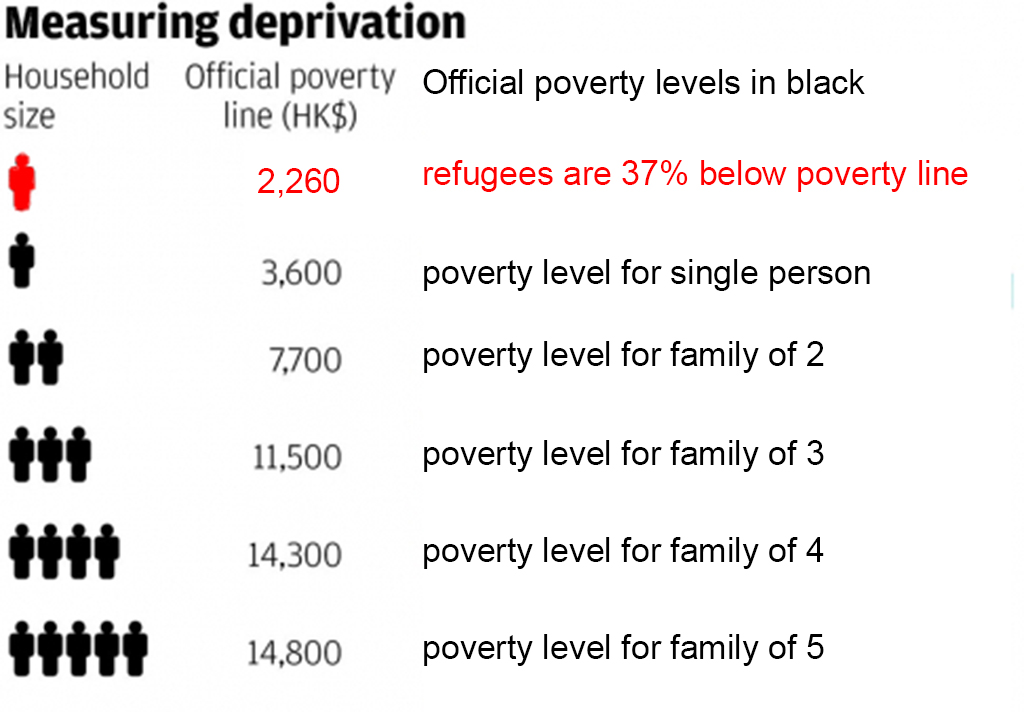
Understanding the pig farm connection
Oct 23rd, 2013 | Housing, VF Report, Welfare | Comment
In April 2006 the Social Welfare Department signed the first service contract with International Social Service (ISS-HK) to ensure, among other objectives, that refugees during their stay in Hong Kong, “would not be left to sleep in the street”.
[Note: HKSAR refuses to make public contracts between SWD and ISS. From 2006 to 2013 SWD subvented ISS-HK with hundreds of millions of dollars. Details for 2012 are available in these SWD-ISS Service Specifications. On 28 Sep 2012 ISS-HK signed a contract worth HK$ 396,877,881 – including HK$ 40,000,000 in salaries, to be explored in an upcoming blog]
In April 2006 the Government announced the “Voluntary surrender of pig farm licenses”. This incentive scheme encouraged pig famers to surrender their licenses voluntarily and cease pig farming to reduce associated public health and environmental pollution problems. At that time local farms supplied markets with 20% of fresh pork, a quantity later replaced by imports from the Mainland.
The ex-gratia payment to the pig industry was budgeted at HK$ 941,700,000 (min. HK$ 450,000 and max. HK$ 25,450,000) to close down pig sheds and surrendered licenses. As a corollary the Government introduced legislation to stop the issue of new licenses and froze the rearing capacity of those not joining the scheme. In brief, pig farming stopped and sheds lay empty.
For a while the farmers were content with the pay-outs, but they soon looked upon empty sheds and wondered how to redevelop them profitably. Most remain abandoned to this day, though a few unscrupulous landlords turned animal farms into refugee ghettos. It is unclear how the conspiracy started, though there is evidence that ISS pushed refugees to the farmers in 2007.
Vision First is investigating numerous violations of several ordinances. Chief among our concerns are violations of Section 25 of the Building Ordinance which specifies land use. With regard to breaches of Section 25, the penalties are defined in Section 40 as a level 5 fine (50,000$ per offence) and imprisonment for one year. More critically, the Government may impose an encumbrance, impairing the transfer and lessening the value of the land.
There is no excuse for conspiring with pig farmers to settle refugees illegally.


